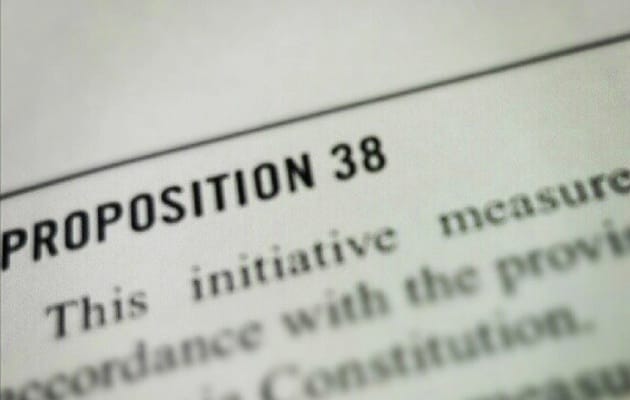LAO Provides Independent Analysis on Proposition 38

Credit: kcet.org

The Legislative Analyst's Office (LAO) provided an independent analysis of Proposition 38, a California ballot initiative championed by civil rights attorney Molly Munger, that would raise income taxes to increase state funding for education.
Proposition 38 is competing with Governor Jerry Brown's Proposition 30, which would raise income taxes only on Californians making over $250,000 per year while also increasing the state sales tax. The measure would provide the general fund with $6 billion in additional revenue to avoid automatic trigger cuts to education. If both measures pass, the one receiving the most votes would go into effect.
According to the analysis of Proposition 38, the measure would add an additional $10 billion per year in state revenues by increasing personal income tax rates on Californians making over $7,316 per year, and on joint filers who combine to make over $14,642.
Through 2017 the revenues created by the tax increases would go into a newly created fund called the California Education Trust Fund (CETF). Sixty percent of the new revenue would go to schools, 30 percent would go towards state debt payments, and the remaining 10 percent would go to Early Care and Education (ECE). From 2018-2014, 85 percent of funds would go towards schools and 15 percent towards ECE. Schools would receive roughly $6 billion annually from the measure, with $4.2 billion allocated for education program grants, $1.1 billion for low-income student grants, and $700 million for training, technology, and teaching materials grants.
In an interview with Brad Williams, a consultant for Yes on 38, who helped draft the tax provisions of the initiative and has been retained to help the campaign with budget and tax related issues, he said that he believed the LAO "did a good job."
"They did raise a legal issue that we do not agree with. According to the analysis, revenues to schools and early childhood programs will start to be distributed in 2013-2014, should the measure pass. Those funds should be released as soon as practical in the current fiscal year. The intent of the initiative is that the money be distributed as soon as possible, and we believe the language is consistent with that intent. If Proposition 38 passes there will be a lot of interest in immediately spending the over $5 billion raised in the current year. The money is clearly there, and the distribution is laid out in the imitative, so why wait?""As for the trigger cuts that have been discussed if Proposition 38 wins instead of Proposition 30: what that argument fails to recognize is that Proposition 38 does provide a lot of resources for the non-school part of the budget. If Proposition 38 passes, the debt service provisions frees up additional general fund money to fund higher education and/or other priorities to offset the need for those trigger cuts. Under the budget that was enacted there would be trigger cuts. However, the point we would make is why would you have those triggers take effect when you have all those resources available, $3 billion a year, that can be spent on state priorities?"
The No on 38 campaign was contacted for comment on the LAO analysis, but have not responded.
Those who actively oppose Proposition 38 have argued that the initiative targets small businesses with its tax increases because many California businesses file personal income taxes rather than corporate taxes. The effect of the tax increases on small businesses will be a loss of jobs, they argue.
Opponents also argue that the $120 billion in tax increases will not improve outcomes because the initiative lacks requirements to improve school performance and it cannot be amended for twelve years, even in the case of fraud or waste. Additionally, they argue that the measure will not reduce the state's deficit, although the LAO analysis shows that 30 percent of the funds will go towards state debt payments through 2017.



